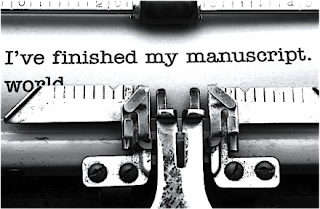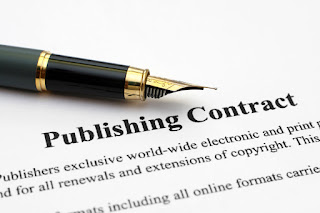It’s been a long process, but I’m finally ready to begin
submitting my memoir to literary agents. After more than three years of
writing, editing, receiving comments from readers, and making more edits, I’m
feeling good about the book. I have studied the most effective ways approach
agents and know that I need to follow their instructions for submission
exactly. Let the process begin. I am realistic, girding myself for rejection,
but willing to be persistent. Wish me the best.
Monday, July 15, 2019
Sunday, November 25, 2018
Searching for an Agent
There are five major publishing houses in the United States. Within each of those publishing houses are many, many imprints, or subsidiary publishers. If you want to have a book published by any of these, you must go through a literary agent. With the very rare exception, major publishers will not deal with individual writers.
So, while I
am awaiting comments from readers of my memoir, I am researching literary
agents/agencies and their specific requirements. So far, I have created a
spreadsheet of 28 agents or agencies that accept memoirs and that I think are
approachable. I used a couple of websites to find these.
I found the second resource to be the most useful.
Each time my
search lead me to a specific agent or agency, I went directly to that website
and researched some more. It had to feel like a good fit.
It is not
important to find a local agent as submissions are handled electronically. Most
agents seem to be on the East Coast, followed by the West Coast.
Quite a few
of the agencies recommended reading How
to Write a Book Proposal. I purchased the 5th edition, which is
by Jody Rein with Michael Larsen and am organizing files of general materials
frequently requested by agents so I can pick and choose according to their
specifications. For example, some of my file titles are Author Bio, Targeted Audience,
What Makes My Book Stand Out from Others,
and Chapter Summaries. Agency
websites often have general information on book submissions as well.
While
agencies usually require a great deal of information (I’m estimating 40-60
pages), I also need to be able to create some type of introduction that will
convince the agent within the first paragraph or two that my submission is
worth reading. I don’t mean that they want 40-60 pages of my actual memoir;
instead, they mostly want support material to convince them it’s worth their
time.
So, I will
have my multiple general files on which to draw, but each agent seems to want
something different, so I will regard my files as resources from which I can draw
information. It will be important for me to read and fulfill the exact material
required by each agent. This can be found on their individual websites.
Wish me luck.
It is a lot of work, so I know I will have to remain dedicated to the process.
Sunday, October 14, 2018
Why I’m Not Sorry It Took 2 ½ Years to Finish My Memoir
Well, I finally finished writing my memoir about growing up at our family cabin. It took 2 ½ years, which is far longer than I anticipated, but that’s okay. The writing was on my mind for most of that time, and I found that almost every night as I was going to sleep or first thing in the morning as I awoke, I realized something else that I wanted to incorporate. Had I forced myself to finish according to a predetermined timeline, I would have missed out on all those extra memories that just kept flowing. I also had time to carefully consider the structure of the book. Because of this, my writing morphed from a simple collection of stories to something that I hope will have more universal appeal, bringing in emotions to which others may more readily identify.
A couple
days ago, I emailed the completed manuscript to my primary reader—the friend
who first encouraged me to create an outline with a deadline for each section. I
sent the last chapter to him for his comments a year ago. The past 12 months, I
have incorporated his suggestions and continued to combine, delete, embellish, rearrange,
and generally edit my writing. Now I shall await the next comments of this good
friend. Once I receive and incorporate his feedback, I will send the manuscript
off to other friends and family members who have volunteered to read and
comment. While all that is happening, I plan to research literary agents,
hoping to find someone who will help me find an appropriate publisher. I
realize finding a good publisher is a longshot, but nothing ventured, nothing
gained.
Monday, March 27, 2017
Writing an Unforgettable Memoir
Each time I attend another class at Lighthouse Writer’s Workshop, I realize how much more effort I must put into the writing my memoir. This
most recent class, taught by Candace Walsh, was
probably the best so far.
After about nine months of typing away at my computer,
I realize I have recorded about half the stories of growing up at our family
cabin in northeastern Minnesota. Once I get all the stories in place, I think
the real work will begin as I edit, rearrange to make the story flow well, and
work on the craft of writing. People like to read memoir because they like to
see how others solved their problems.
The best memoirs include an obstacle that must be
overcome. Examples.
- The Glass Castle—How can the author accept that her parents don’t act like parents should?
- Between the World and Me—How can the author prepare his son for an unjust society where they are in constant danger?
- Licking the Spoon—How can the author learn to feed herself, nurture her soul, and figure out how to give and receive love, when she grew up in a house where she felt her parents did not see her?
Some of the concepts I will need to incorporate are
- The impact of loss through people dying, divorce, and neighbors no longer coming up to the lake.
- Tension, suspense, and conflict dealing with nature and with people.
- Personal reflection—what I saw/experienced and what those experiences really meant. How did they drive my future behavior? How did they transform my life?
- Being at the cabin was such a happy time, and it was lost as I became an adult. How can I resolve the loss of the innocence of childhood?
- Are there other internal and external conflicts I need to explore?
I will also need to flesh out the story through
- Details, details, details, including lots of sensory images. The reader should feel not only a sense of place, but of time.
- Relating the senses to emotions using similes and metaphors. (i.e., “He felt out of control like a …..”)
There are certain universal themes on which I want to
build. If you are at a loss for ideas, do an Internet search on universal themes. Some that I want to
explore are
- Mortality
- Perseverance
- Family
- Freedom
- Friendship
- Innocence
- Love
- Nature
- Change
- Self-awareness
- Self-reliance
- Coming of age
Questions to consider while writing memoir.
- How much of the story should be embellished?
- Am I able to admit that this is my story of what happened, which might be quite different from the memories of others who were there?
Books to read that will help me to better understand
memoir.
- The Art of Memoir, by Mary Karr
- The Faraway Nearby, by Rebecca Solnit
- So Long, See You Tomorrow, by William Maxwell
- Love Medicine, by Louise Erdrich—good example of bookending a story
Monday, February 20, 2017
The Business of Book Publishing
Last
weekend, I took an excellent all-day class at Lighthouse Writers Workshop titled
The Business of Book Publishing. It was
taught by Shana M. Kelly, a literary agent who currently works for Einstein Literary Management. Here are my notes from the class.
The Industry
Over
the years, publishers have merged and merged and merged. Currently, there are
five big publishers:
- Penguin Random House
- Simon & Schuster
- Hachette Book Group
- HarperCollins
- Macmillan
Each
of these publishers has numerous imprints, or trade names that specialize in
various demographic consumer segments. To
publish in any of these big five houses, the writer needs an agent to pitch a
book.
When
trying to market one’s own book, it is recommended to
- First try to find an agent. Decide in advance the level of your tolerance for rejection. Can you handle not hearing from or being out-right rejected by 10 agents or 100 agents?
- If it does not work for you to find an agent, try marketing your book to a medium-size publisher. The medium-size publisher will often work with or without an agent.
- Next, try a small publisher.
- If none of the above work, self-publish your book.
Preparing to Market Your Book
Understand
the market. There are basically three different types of fiction books: Literary,
Upmarket, and Commercial. Into which category would your book fit?
- Literary—Analyzes reality. Often contains social commentary, political criticism, or focus on the human condition. Language and excellent writing are important.
- Upmarket—Character driven. Appropriate for book club discussions. (My personal opinion: These books often become best sellers, but are not enduring like literary books.)
- Commercial—Plain entertainment. Fast paced. Escapism. In the end, everything is tied up in a neat little package of resolution.
Decide
who your reader will be—age, gender, geographic location, education, beliefs,
interests.
Determine
your genre. Research the books that sell in this genre. Are there guidelines,
such as length that you should keep in mind?
I am
currently writing a memoir. There are sub-genres within memoir. I need to be
able to describe how my book fits within those sub-genres.
Research who publishes books like yours.
- Explore websites of the big five publishers
- Go to bookstores
- Engage in social media—follow authors, agents, and publishers on Facebook and Twitter.
- Start a spreadsheet of agents and publishers you want to keep in mind when you are ready to submit your book. In the spreadsheet, include contact information, where you heard the person’s or company’s name, and why you think it might be a good match.
Can
you compare your book to those by other authors? Determine who represents those
authors. Often this information will be listed in the acknowledgements of the
book.
Work
on a pitch and query letter. Have both a verbal and a written pitch prepared,
and make certain they are different from one another.
Submission
Prioritize
agents into groups from most desired/best fit on down. Send your query to 10-15
agents at a time. Be prepared for rejection. Most agents won’t even get back to
you. (They are swamped with work.) If you haven’t heard from anyone in 2-4
weeks, send another batch.
The
query letter
Do not send anything more than a query (such as a summary or manuscript) unless it is requested.
- Do not send a query letter unless your manuscript is ready. Your manuscript needs to be in good condition in case it is requested.
- Be sure to read and follow any submission guidelines on the agent’s website.
- Send the query to a specific person. Before sending, be certain that you have current information as people often change jobs in the publishing industry. Read the agent’s bio. Is there anything that connects you to that person? If so, mention it.
- Tell the agent why you chose him or her.
- The letter should be no longer than one page and should be pasted into an email. Do not send it as an attachment. Many companies have firewalls that will not allow them to open attachments.
- In the query, describe your book. Focus on the most unique, intriguing, or sellable part. Don’t try to tell the whole story. Your main goal is to have the agent want to read more. Show your personality. Say to whom the book would appeal and why someone would want to buy the book.
- Include a couple of sentences about yourself if it is pertinent to the book.
- Include contact information.
Publishing Relationships
An
agent is your business liaison.
- The agent will market your book to publishing companies, then be kept in the loop after that.
- It is best to have an agent with foreign rights as that person will get you a better financial deal than the publisher. Make certain that you choose an agent who has contacts with foreign publishers.
- Once an agent expresses an interest in your query letter, he or she will request either a synopsis or an outline (chapter titles with description of each chapter).
Agents
are knowledgeable about what publishing houses and imprints are accepting what
types of books. The agent will pitch your book to the appropriate editors. Once
a good placement has been found, the editor will make a deal with the agent. A
contract is between you and the publisher, with the agent listed as your
representative.
Most
signing contracts are templates, so there is not a lot of wiggle room. The
agent will also help you through the contract process, including the royalty
structure. A typical starting hardcover royalty is 10%; trade paperback is
7.5%. Royalties usually rise as more books are sold. For instance, they might
rise after 10,000 copies are sold and again after 25,000 copies. Most first
time writers are not printed in hardcover, but go straight to paperback.
Your
agent will take 15% commission out of every check sent to you; 20% for most
subsidiary rights.
Once
the agent sells your book to a U.S. publisher, he or she will work with
sub-agents who sell other rights, such as audio, translations, or TV/film.
You
will be assigned an editor who works with a team of publicists, marketers, and designers.
Your editor will pitch your book to bookstore representatives.
Additional Resources
Websites
- Publisher’s Weekly—Reports on new deals, trends, bestsellers. Some information on the website is free. A subscription is very expensive. You might want to see if your library subscribes to the publication.
- Publisher’s Marketplace—Use to find agent information and publishing news. Some information is free. The site costs $25/month to subscribe and can be done on a month by month basis.
Sunday, November 6, 2016
Pitching Your Book to an Agent or Editor
Recently, I
attended another workshop at Lighthouse Writer’s Workshop. This one
was titled Pitch Perfect: Sell Your Book
in a Single Sentence and was facilitated by Angie Hodapp of Nelson LiteraryAgency. While the class was geared mostly for fiction, I tried to adapt it to the
memoir I am writing. My notes from the class follow.
First write the
entire manuscript, then make certain it has a unifying factor and appeals to a
wide audience. It should have the following.
- Character introduction
- Inciting incidents
- Turning point
- Climax
- Resolution
Study books that
are comparable to yours. Look at reviews on Amazon and Goodreads to understand
what’s selling and why.
Understand your
genre and subgenres. Possible subgenres for memoir include those listed here. Google
Figure out the appropriate
word count for the genre of your book. When talking to agents and editors, tell
them the number of words in your book, not the number of pages. Pages are
determined by the printing process—size of page, type of font, layout, and whether
pictures are included. You can do an Internet search for the appropriate word
count of your book genre. My goal for memoir is approximately 80,000 words.
When talking to
someone about the book you’ve written, you will probably have about one
sentence to grab the individual’s attention. This includes agents and editors. If
you can hone the description down to one sentence, you will sound highly
competent and confident. Talk about the book in a way that makes the person say,
“Oooh, Tell me more.”
In your pitch of
fiction, include
- Character(s)
- Goal
- Motivation
- Conflict or tension
- Stakes (what your character stands to lose if he doesn’t achieve his goal)
- Beginning and end
- Reason for writing
Attend writer’s
conferences where agents and editors will be present.
- Talking with them is often included in the price of the conference.
- The people you will speak to are generally only interested in books you have completed.
- You can usually sign up for a 10-minute appointment. During that time, plan to spend about two minutes talking about your book and eight minutes interacting with the agent. Include one thing about yourself that will make you memorable. Be prepared to talk about what inspired you and what made you excited to write this book.
- While editors and agents are usually only interested in books that are finished, make an appointment even if you are not finished.
- Go with questions for the agent/editor.
- Agents and editors often hangout in the bar during down time. Approach them there as well. Be polite and ask them if you can talk with them about your book.
- Do not get upset about rejection. It is all part of the process of marketing your book.
- AgentQuery—online data base for types of agents
- Writer’sMarket—contains agent lists and other helpful information. Requires a subscription.
- Publisher’sMarket Place—agent profiles plus all the latest in the publishing industry. Requires subscription.
There are
several ways to let people know about your book. Practice all of them.
- Synopsis—A summary that is several pages long
- Pitch paragraph—Will fit on one page. It may be 2-3 paragraphs long. Looks much like a book jacket summary. This is what would be included in a query letter.
- Elevator pitch—Talk about your book in the time it would take for an elevator ride.
- Logline—What might appear on a movie poster.
Consult QueryShark for advice on writing query letters to send to agents and editors.
When writing to
an agent or editor, never attach a manuscript unless you are invited to do so.
If you are on
Twitter, you can pitch your book using the hashtags Pitman and/or Pitchwars.
Do a Google search on Twitter Pitches
to find advice on writing these.
Books to read
for more ideas:
- Anatomy of Story: 22 Steps to Becoming a Master Storyteller, by John Truby
- Books by James Scott Bell, who writes about the writing process
- Thinking Like Your Editor: How to Write Great Serious Nonfiction and Get It Published, by Susan Rabiner
Thursday, November 3, 2016
Making Chapter Deadlines: Follow-up from My Last Blog Entry
Good news…so
far, I have made every one of my chapter deadlines. In May, my good friend Jeff
had me create a chapter outline for the memoir I wanted to write on growing up
at our family cabin. Along with the outline, I created due dates for submitting
chapters to him for critique. So far, I have completed five chapters, emailing
each one on time. This has been a wonderful tool of accountability. His
comments, in turn, have been very helpful, mostly suggesting topics that need
additional development.
The more time I
spend working on the memoir, the more I am enjoying the process. I am amazed at
the detail I am able to conjure up from so long ago. The writing has also given
me an excuse to talk more with my two brothers about our experiences in the north
woods of Minnesota.
My ultimate goal
is to write approximately 80,000 words.
Subscribe to:
Comments (Atom)










